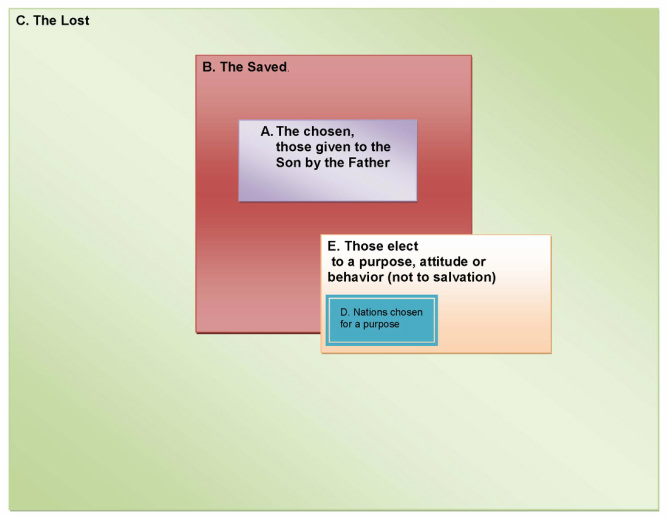
It’s really quite simple. Every time you come across a passage that allegedly proves the tenets of four- or five-point Calvinism, ask yourself questions like these:
- Who is under discussion, specifically? Consider digging a little deeper than “the saved” or “the lost.”
- What is under discussion? Salvation? Or something else, such as temporal purpose or earthly destiny?
- What’s the larger context?
- Is there any other reasonable explanation that I might look into, such as grammar that would unnecessarily transform the original meaning, or history that might shed light on the situation at hand?
It helps greatly to have some solid training in grammar. It also helps to have some experience in solving logic problems; I was raised on them, and perhaps you were too.
But even if you weren’t, it’s really not rocket science.
Consider this diagram illustrating five different categories of people.
Then consider Calvinism's proof texts in light of this diagram. For instance, how ‘bout the folks in John 6:36? Do they not fit quite nicely into Category C? Or think about those in John 6:37a and b –not A and B, respectively? And so on.
I have yet to come across a verse where Scripture requires placing anyone in a hypothetical 6th or 7th category, “saved only because God has chosen them” or "condemned to hell because He did not chose them.”
No doubt there are a few difficult passages. In these cases, I do some digging. Sometimes I'm left scratching my head. But sometimes I'm not.
For instance, there's Acts 13:48b: "... as many as had been appointed to eternal life believed." It turns out that for some reason, most (all?) translators decided to render this line in the passive voice rather than the middle voice; it could just as easily have been presented thusly: “as many as set themselves to eternal life believed.”
And Calvinism also has some ‘splaining to do about a number of passages -- for instance, those concerning issues like these:
· Isn’t God’s will salvation for all? 2 Peter 3:9, 1 Timothy 2:3-4, Romans 11:32 and 2 Corinthians 5:19 would seem to say so.
· Doesn’t God provide it for anyone? Passages like 1 John 2:2, John 6:40, 1 Timothy 2:6, Hebrews 2:9 and Isaiah 53:6 would seem to imply that He does. Is there really a compelling reasons to view straightforward phrases such as “the world” as shorthand for "the world of the elect”?
· Doesn’t He give man a choice to believe or not? Again, unless we start insisting that plain words like “whosoever” really mean something else, it would certainly seem so according to passages such as John 3:16 and Acts 13:46.
· Doesn’t He draw all men? He does, according to John 12:32. (Note that “men” is presented as “peoples” with an “s” in NKJV, changing the meaning radically. And whichever word is used, it was apparently ADDED by the translators – unnecessarily, since “I … will draw all to Myself” doesn’t require any addition, because “all” is also a noun perfectly capable of standing on its own.)
· Doesn’t He enable anyone to respond? You’d sure think so, according to John 1:9 and 16:8-9, Mark 16:15-16, Acts 17:30 and 16:31.
And a bonus question for those who are already delving into modern Calvinism's TULIP: Don’t some men actually refuse? Don't Romans 10:21 and Matthew 23:7 present us with examples indicating that some actually do refuse Him? Where’s the irresistible grace?
Okay, so I don't have even a basic degree in theology, let alone an advanced degree. And I’ve only been studying the Bible seriously, and daily, for a decade or so. I still have a real problem seeing the Lord God – the perfectly sovereign God of perfect love, mercy, and justice Who suffered and died to pay the penalty for my sin – portrayed as One who creates lost people solely to suffer in hell for all eternity, leaving them with no way out. I don’t believe that this conclusion is warranted by Scripture. And to me, it sounds way too much like the cosmic sadist described by atheists like Richard Dawkins.
 RSS Feed
RSS Feed